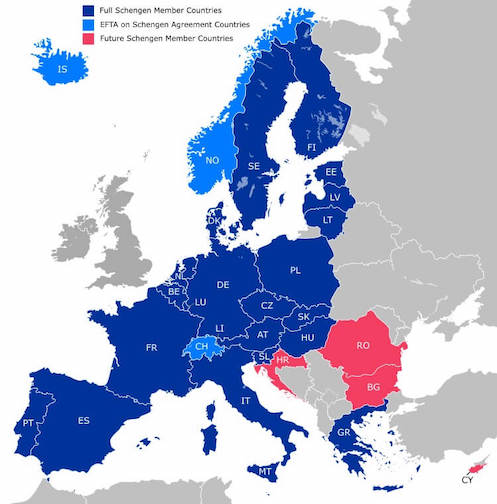The rules for traveling to Europe are changing
If you are thinking about a European vacation in 2024, you should be aware that ETIAS, the European Travel Information and Authorization System, is supposed to go live in 2024. We say “supposed to” because the launch of the program has been postponed several times since it was first proposed in 2016.



No official start date has been set, but, like many things in Europe, that could change without much notice. So, in the spirit of “forewarned is forearmed”, we wanted to give you some advance warning.
Here’s a succinct summary of the program from etias.com
ETIAS is a visa waiver program expected to become operational in 2024. This program applies to citizens from countries that are visa-exempt for entering the Schengen Area, primarily to enhance security within the region.
If that doesn’t make complete sense to you, you’re not alone. Let’s unpack some of the details.
First, what is a “visa waiver”?
Some news reports refer to ETIAS as a visa program. It’s not. It’s an electronic travel authorization program. (And yes, it does seem like there’s a bit of a semantic game being played here.)
Today, people from many countries, including the US, Canada, Mexico, the United Kingdom, and Australia are permitted to enter most of Europe (the “Schengen Area”, see below) without a visa. When ETIAS is launched, persons from those visa-exempt countries will need to apply for the “visa waiver” and receive authorization to travel. The authorization will be stored online by ETIAS and will be associated with your passport. (More on the application process below.)
Next, what is the “Schengen Area”?
The Schengen Area is a group of 27 European countries who have signed onto the Schengen Agreement, a treaty originally signed in 1985 outside the town of Schengen, Luxembourg. The Schengen Agreement was created to facilitate free movement across borders, stimulate trade, and strengthen the security of the member states.
The Schengen Area includes most, but not all, members of the European Union. The details are beyond what we want to tell in this post. But if you’re curious, like Mike, and you want to get into the weeds on this, please see his new Rabbit Hole note – “ETIAS – Getting in the weeds”. He has also included links to all the articles he used in researching this post.
Why is this happening?
ETIAS is being implemented to improve security in the EU and Schengen member countries. By capturing data on non-EU travelers before they arrive at the borders of the Schengen Area, the system is intended to ensure that those travelers do not pose a risk to the Schengen countries or their citizens.
ETIAS is modeled after ESTA, the Electronic System for Travel Authorization, that was implemented by the United States in 2008. ESTA requires citizens from 40 countries (including most of the Schengen and EU countries) to apply for pre-authorization to travel to the US for trips of 90 days or less.
How do I apply?
The short answer is “You can’t…yet.” But when ETIAS begins accepting applications, they will be processed online at https://etias.com/etias-application . The application form will ask for a number of personal details that will be used to confirm your identity, including:
- Valid passport / Travel document information
- Full name
- Current address
- Citizenship status
- Sex
- Preferred gender
- Dual citizenship status
- Email address
- Telephone number
- Date of birth
- Final destination member state
- Educational background
- Occupational background
You may also be asked about your criminal history, past incarceration, felon status, past European travel, drug use, and health history.
How long will it take to get approved?
According to the ETIAS FAQ, most applications will “most likely” be processed within 20 minutes. If there are issues with your application, you will be notified by email within 96 hours. Additional documentation may be requested and you might be asked to sit for an interview, online or in-person, at an EU consulate. After the interview, you will be notified of their decision within 48 hours.
It could take as long as 30 days to complete your application. There will be an appeals process for persons whose applications are denied.
Now since the system is not operational yet, this is all theoretical. Those of us who have dealt with SEF, the Portuguese border control agency, know that estimates of processing time are usually wildly understated.
To safeguard any trips you’re planning, you’ll want to apply as early as possible.
What does it cost to apply?
The application fee is €7, but applicants under 18 or over 70 years old are exempt from payment. (For comparison, the ESTA authorization to enter the US costs $21.)
How long is the ETIAS authorization valid?
The travel authorization will be valid for three years or until your passport or travel document expires, whichever comes first. So if your passport expires in 18 months, so will your ETIAS authorization. (The US ESTA authorization is only valid for a maximum of two years.)
Two…er… one unanswered question
As we did the research for this article, we noted two questions for which we could not initially find answers.
The first question: Is ETIAS authorization required for holders of Portugal Temporary Residence certificates?
In other words, for folks like us who are living in Portugal with titulos de residências, would we need ETIAS authorization to return to Portugal after a visit to the US?
But after some additional reading, we found this note on the European Union’s ETIAS FAQ page:
Q: Is ETIAS travel authorisation equivalent to a residence permit or visa?
A: No. Having the travel authorisation only allows you to enter and remain on the territory of the European countries requiring ETIAS for a short-term stay.
Also, it does not give you the right to study long-term or to work in these countries. If you plan to stay … for a longer period, you will most likely need a long-term visa.
Travellers with a valid visa do not need an ETIAS travel authorisation.
Since we’ll be traveling on US passports, we expect we’ll have to show our temporary residency cards when we pass through European border control.
That leaves the big unanswered question: When does ETIAS go into effect?
The same FAQ page couldn’t provide a specific answer:
That’s what we know for now
Beyond the big question of “when”, there are lots of other, smaller questions that will probably only be answered once we see ETIAS in action.
On the ETIAS Application page, you can sign up for updates on the ETIAS launch date and any new requirements. We’ve signed up and will post anything we see. If you’re thinking about traveling to Europe in 2024, you should probably sign up, too.
Until next time / Até a próxima vez
Mary and Mike
The Cook and The Writer

What’s your favorite place to visit in Europe? We’re adding items to our “must visit” list. Leave your recommendations in the comments below or via the Contact Us form.



Very informative! Must share. Thank you, Mary & Mike. <3
Thanks so much for researching this issue. I had the same question about those of us with temporary residence visas being required to have the waiver. I appreciate your work in getting this information for all of us to read.
I just returned from a “Girls Trip” to Amsterdam and Paris. A very challenging time of travel due to weather in both countries. Lots of rain and wind. Amsterdam was not as clean as I remember and of course very crowded. The food was great and the Train Station is amazing. After missing our train to Paris and spending 5 hours there I must say we observed many “Pick Pockets” there. Be very careful in the Starbucks. I heard many stories about trouble in the Metro too in Paris, but we managed to stay safe and still have a great time. I do Love Paris and all was surprised how friendly all the Parisians were, even the taxi drivers. They are preparing for the 2024 Olympics and some construction going on around monuments, etc. We did hear about the new Visa waiver during our travel and that will be very interesting for travel next year. Bon Voyage and Happy Traveling….Love, Sue Story